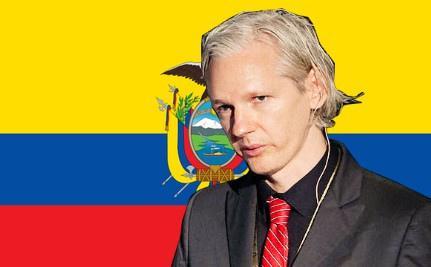 Julian Assange wins asylum in Ecuador – but can he get there?
Julian Assange wins asylum in Ecuador – but can he get there?
The background
WikiLeaks founder Julian Assange, who’s been holed up at the Ecuadorian Embassy in London for nearly two months in an attempt to avoid extradition to Sweden on sexual assault charges, has been granted political asylum by the South American nation.
Whether he gets there, however, is another question.
Ecuadorian foreign minister Ricardo Patiño announced Thursday Assange had been granted diplomatic asylum in the country’s capital city, Quito, on the grounds that he could face “political persecution”. Assange fears that should he be sent to Sweden, he could be extradited to the US, where he would stand trial for treason and espionage in connection with WikiLeaks’ dumping of classified US files.
But Assange is already in violation of his bail terms and on Wednesday, the UK government “threatened” Ecuador with revoking the embassy’s diplomatic protection, which would allow officers to go in and collect Assange. British police have also increased their presence around the Knightsbridge embassy, planning on arresting Assange as soon as he sets foot outside – even now that he’s been granted asylum.
Calm down, there won’t be any ‘storming’
Despite the fears of both Ecuador and the Assange supporters gathered round outside the Embassy, it’s unlikely that this standoff will end with SAS troops crashing through the tony Kensington building’s windows – the UK’s communication was less a “threat” and more a reminder, wrote lawyer David Allen Green at The New Statesman. In fact, it’s much more likely drawn-out and very expensive litigation will be the result. The UK has a responsibility to extradite Assange to Sweden and it’s trying to fulfill that. But the longer “due process” is avoided, the longer the alleged sexual assault victims have to wait for justice: “That is the real scandal.”
Little has really changed for Assange
Despite Ecuador’s pronouncement and the UK government’s threats, Assange’s situation hasn’t really changed: He can’t leave without being arrested. But the whole situation is a “catch-22” for the British government, wrote Peter Beaumont at The Guardian. The UK doesn’t want to further disrupt diplomatic relations with Ecuador, or set an international precedent of stripping embassies of their diplomatic rights that may come back to bite it. But it also can’t let Assange remain a fugitive from European law, protected in an embassy on British soil. “And so Assange stays put for now.”
Ecuador is right to stand up to the US
That the UK government would go so far as to threaten Ecuador indicates that Assange would likely face not only extradition to the US from Sweden, but political persecution there as well, argued Mark Weisbrot at The Guardian’s Comment is Free. Ecuador was right to extend asylum to Assange: “It is probably the first time that a citizen fleeing political persecution by the US has been granted political asylum by a democratic government seeking to uphold international human rights conventions. This is a pretty big deal, because for more than 60 years the US has portrayed itself as a proponent of human rights internationally – especially during the cold war.” Now it just remains to be seen if the UK will “respect international law and human rights conventions and allow Assange safe passage to Ecuador.”
Assange is just wrong, in general
Governments need their secrets: “Julian Assange and his dwindling band of followers might wish for a world without political secrets,” wrote David Blair at The Independent. “If, heaven forbid, that were to happen, they would create a world of eternal bloodshed, for no longstanding conflict has ever been resolved without covert contacts, often conducted through deniable back channels.”
More on Julian Assange and WikiLeaks
- Julian Assange seeks sanctuary at Ecuadorian Embassy
- Assange to be extradited
- Assange and the suspension of WikiLeaks
- Assange shows up at Occupy London

